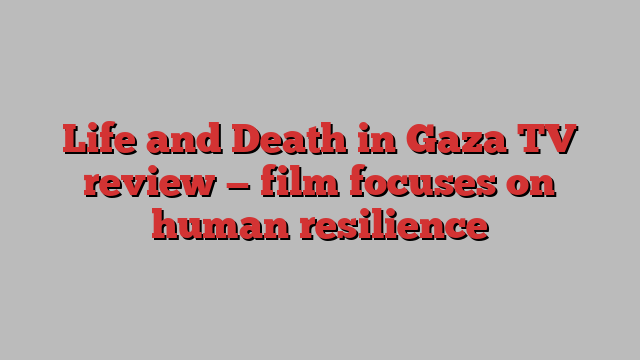
Unlock the Editor’s Digest for free
Roula Khalaf, Editor of the FT, selects her favourite stories in this weekly newsletter.
At the start of this BBC documentary, we see Gaza as we haven’t seen it recently: a five-a-side football game on a rooftop AstroTurf pitch; small boats bobbing in the harbour; a white horse grazing peacefully on a green roundabout.
“Gaza was beautiful,” a young woman called Aya tells the camera. “But it wasn’t perfect.”
We know what’s coming next. After the Hamas attacks of October 7, the ensuing Israeli assault reduces Gaza to rubble and despair.
Life and Death in Gaza tells four families’ experiences. It focuses not on endless horror, but human resilience. This is overdue. Israel has denied the world’s media access to Gaza. So coverage of the war, in which Gazan authorities say 42,000 people have been killed, has had more statistics than stories.
Aya is a 23-year-old law graduate, bright-eyed with possibility. Khalid is a physiotherapist. Adam is a youth worker. And Aseel is preparing to give birth while her husband Ibrahim, a photographer, documents the surrounding destruction. Their testimonies, especially taken together with the BBC’s Surviving October 7th documentary about the Nova Music Festival massacre, help us understand how much has been lost in the past year of conflict.
Some of the most poignant moments involve children. Khalid’s five kids role-play ambulance drivers and war victims. “My heart breaks,” he says. If only it were just a game. “Mum! Let’s not sleep here any more!” cries his daughter after a nearby bombing. Yet when Aseel gives birth, she sees her daughter as bringing hope.
Early on, the film quotes Israeli Prime Minister Benjamin Netanyahu: “I say to the residents of Gaza: leave now because we will operate forcefully everywhere.” Of course, most Gaza residents can’t leave, because Israel and Egypt keep the borders shut. We see Gaza’s beautiful blue sky, occasionally peppered with Israeli leaflets telling residents to evacuate. The four protagonists leave their homes, and struggle to find food and safety.
This film, made by the BBC World Service investigative unit BBC Eye, contains moments of wisdom. In October 2023, Adam notes that part of the aim of the war is to make you feel worthless, as if “the world doesn’t care if you live or die.” His father, ill with Parkinson’s, does die in an overstretched hospital. Adam and his sisters start living in a tent city. By March, thanks to a brother abroad, they have raised the $7,000 a person needed to cross into Egypt: “the price of fleeing death, war, genocide.” Adam bids goodbye to Gaza, looking at the Mediterranean — “the one thing that hasn’t changed since October 7.” It’s the sea that gives him hope that Gaza can recover.
The film is not as hard to watch as some viewers might fear. At times it even feels mundane. That seems the result of having to rely on ordinary people as camera operators. Sometimes you wish the protagonists would reveal more of their inner thoughts. The film is also non-political. The participants never opine on Hamas or Israel: previously, Gazans criticising Hamas have faced reprisals.
By the end, Khalid has started to rebuild his house and set up a new clinic. Aseel refuses to leave Gaza. Aya’s hopes of studying in Italy have been scotched, her house destroyed, her uncle killed. “No one cares about us,” she says tearfully. It’s hard to disagree. In Gaza, human resilience is being pushed to its limits. Perhaps the least we can do is watch.
★★★☆☆
BBC2, 9pm on October 15 and iPlayer